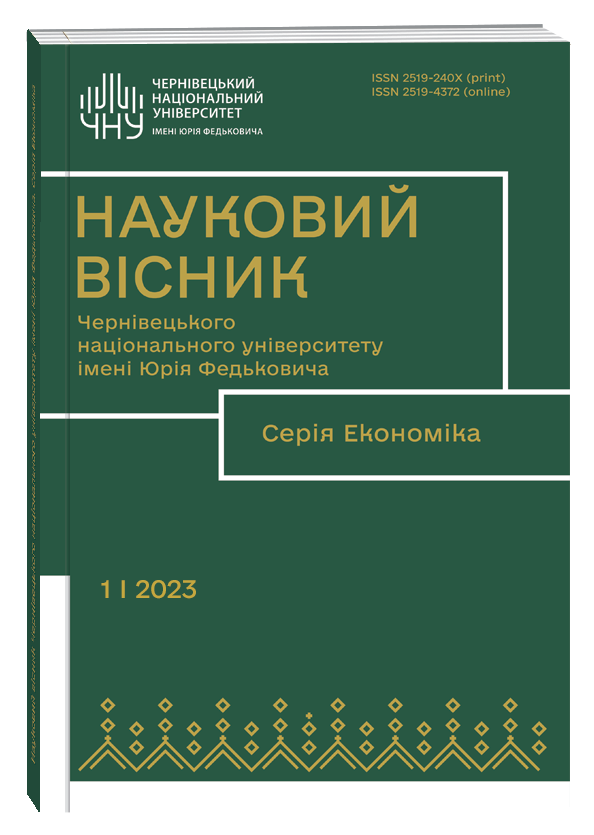A CLUSTER APPROACH IN INTEGRATED WATER RESOURCE MANAGEMENT IN THE IRRIGATION ZONE
DOI:
https://doi.org/10.32782/ecovis/2023-1-7Keywords:
cluster approach, integrated management, water resources, irrigation, innovations, investments, sustainable developmentAbstract
The article substantiates the necessity of using a cluster approach in integrated water resource management in irrigation zones as a modern tool for increasing their efficiency and ensuring the sustainable development of the agricultural sector. The prerequisites for the emergence of clustering as a form of organizing economic relationships are revealed, along with its theoretical foundations and foreign experience, which confirm the effectiveness of this approach in the fields of industry, innovation, and natural resource management. It is determined that in the context of modern challenges—climate change, war damage, and energy threats—traditional water resource management methods have proven to be insufficiently effective. Therefore, there is a need to implement new models of cooperation among state institutions, businesses, scientific institutions, and local communities. The problems of irrigated agriculture in the southern regions of Ukraine are systematized, and the role of clusters in overcoming them is defined. It is substantiated that clusters provide an opportunity to create a multi-level interaction platform that ensures the synergy of participants' interests and resources to solve complex tasks, such as modernizing water management infrastructure, attracting investments, and implementing innovative technologies. The article proposes three key directions for creating clusters: forming a safe environment for agricultural production using demining technologies; developing mechanisms for providing irrigation systems with alternative water sources; and applying renewable energy sources for the needs of pumping stations and irrigation complexes. An original model of participants in integrated water resource management clusters is presented, which defines the key entities: from agricultural enterprises and water user organizations to state bodies, banking and insurance structures, equipment manufacturers, scientific and educational institutions, and international organizations. It is revealed that such a structure ensures the complexity and coherence of actions, contributes to the effective attraction of financial and human resources, and forms the basis for innovative development.
References
Ямчук А. В. Деякі питання побудови інноваційно-інформаційних кластерів. Проблеми науки. 2012. № 4. С. 10–15.
Бондарчук Н. В. Функціонування кластерів: світовий і вітчизняний досвід. Економіка та держава. 2010. № 9. С. 107–109.
Парсяк В. Н., Жукова О. Ю., Ващиленко А. М. Кластери в промисловості: етимологічні витоки та економічний зміст. Матеріали XII міжнар. наук.-техн. конф. "Інновації в суднобудуванні та океанотехніці". Миколаїв : НУК, 2021. С. 504–507. URL: https://rep.nuos.edu.ua/server/api/core/bitstreams/02f4e4c3-6564-4189-a30b-4d72ad457454/content
Комар Н. Концепція формування та державної підтримки кластерних структур в Європі. Вісник Тернопільського національного економічного університету. 2014. № 2. С. 53–64.
Жигірь А. А. Формування кластерів, як світова тенденція, пошуку шляхів підвищення ефективності підприємницької діяльності. Інвестиції: практика та досвід. 2015. № 22. С. 38–43. URL: http://www.investplan.com.ua/pdf/22_2015/8.pdf
Принципи ОЕСР щодо водного врядування. Затверджені Комітетом політики регіонального розвитку ОЕСР 11 травня 2015 року. URL: https://web-archive.oecd.org/2020-08-17/498608-OECD-Principles-on-Water-Governance-ukrainian.pdf.
Левковська Л. В., Зубко А. Г. Сучасні тенденції розвитку зони ризикового землеробства в умовах кліматичних змін. Ефективна економіка. 2021. № 9. DOI: https://doi.org/10.32702/2307-2105-2021.9.12
Жовтоног О., Рижова К., Зубко А. Сценарії реалізації інституційної реформи в управлінні зрошувальними системами. Економіка природокористування та сталого розвитку. 2021. № 10 (29). С. 69–76. DOI: https://doi.org/10.37100/2616-7689.2021.10(29).9.
Yamchuk, A. V. (2012). Deiaki pytannia pobudovy innovatsiino-informatsiinykh klasteriv [Some issues of building innovation-information clusters]. Problemy nauky – Problems of Science, 4, 10–15 [in Ukrainian].
Bondarchuk, N. V. (2010). Funktsionuvannia klasteriv: svitovyi i vitchyznianyi dosvid [Functioning of clusters: world and domestic experience]. Ekonomika ta derzhava – Economy and State, 9, 107–109 [in Ukrainian].
Parsiak, V. N., Zhukova, O. Yu., & Vashchylenko, A. M. (n.d.). Klastery v promyslovosti: etymolohichni vytoky ta ekonomichnyi zmist [Clusters in industry: etymological origins and economic meaning]. Materialy XII mizhnar. nauk.-tekhn. konf. "Innovatsii v sudnobuduvanni ta okeanotekhnitsi". Mykolaiv : NUK, 2021. S. 504–507. [Proceedings of the XII International Scientific and Technical Conference "Innovations in Shipbuilding and Ocean Engineering". Mykolaiv: NUK, 2021. pp. 504–507.https://rep.nuos.edu.ua/server/api/core/bitstreams/02f4e4c3-6564-4189-a30b-4d72ad457454/content [in Ukrainian].
Komar, N. (2014). Kontseptsiia formuvannia ta derzhavnoi pidtrymky klasternykh struktur v Yevropi [The concept of formation and state support of cluster structures in Europe]. Visnyk Ternopilskoho natsionalnoho ekonomichnoho universytetu – Bulletin of Ternopil National Economic University, 2, 53–64 [in Ukrainian].
Zhyhir, A. A. (2015). Formuvannia klasteriv, yak svitova tendentsiia, poshuku shliakhiv pidvyshchennia efektyvnosti pidpryiemnytskoi diialnosti [Formation of clusters as a global trend in finding ways to increase business efficiency]. Investytsii: praktyka ta dosvid – Investment: Practice and Experience, 22, 38–43. http://www.investplan.com.ua/pdf/22_2015/8.pdf [in Ukrainian].
OECD. (2015). Pryntsypy OECD shchodo vodnoho vriaduvannia. Zatverdzheni Komitetom polityky rehional'noho rozvytku OESR 11 travnia 2015 roku [OECD principles on water governance. Approved by the OECD Regional Development Policy Committee on 11 May 2015]. URL: https://web-archive.oecd.org/2020-08-17/498608-OECD-Principles-on-Water-Governance-ukrainian.pdf [in Ukrainian].
Levkovska, L. V., & Zubko, A. H. (2021). Suchasni tendentsii rozvytku zony ryzykovoho zemlerobstva v umovakh klimatychnykh zmin [Current trends in the development of the risk farming zone in the context of climate change]. Efektyvna ekonomika – Effective Economy, 9. https://doi.org/10.32702/2307-2105-2021.9.12 [in Ukrainian].
Zhovtonoh, O., Ryzhova, K., & Zubko, A. (2021). Stsenarii realizatsii instytutsiinoi reformy v upravlinni zroshuvalnymy systemamy [Scenarios for the implementation of institutional reform in the management of irrigation systems]. Ekonomika pryrodokorystuvannia ta staloho rozvytku – Economics of Nature Management and Sustainable Development, 10(29), 69–76. https://doi.org/10.37100/2616-7689.2021.10(29).9 [in Ukrainian].



